Zhang Qun facts for kids
Quick facts for kids
Zhang Qun
|
|
|---|---|
| 張羣 | |
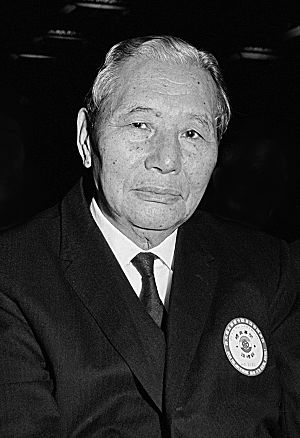
Premier Zhang Qun
|
|
| Premier of the Republic of China | |
| In office 23 April 1947 – 24 May 1948 |
|
| President | Chiang Kai-shek |
| Vice Premier | Wang Yunwu Ku Meng-yu |
| Preceded by | Chiang Kai-shek (acting) |
| Succeeded by | Weng Wenhao |
| Vice Premier of the Republic of China | |
| In office 1 January 1938 – 11 December 1939 |
|
| Premier | H. H. Kung |
| Preceded by | H. H. Kung |
| Succeeded by | H. H. Kung |
| Minister of Foreign Affairs | |
| In office 12 December 1935 – 4 March 1937 |
|
| Premier | Chiang Kai-shek |
| Preceded by | Wang Jingwei |
| Succeeded by | Wang Chonghui |
| Secretary-General to the President | |
| In office 18 May 1954 – 28 May 1972 |
|
| President | Chiang Kai-shek |
| Deputies | Xu Jingzhi Huang Bo-du Zheng Yanfen |
| Governor of Sichuan Province | |
| In office 15 November 1940 – 14 May 1947 |
|
| Governor of Hubei Province | |
| In office 7 July 1933 – 17 December 1935 |
|
| Mayor of Shanghai | |
| In office 1 April 1929 – 6 January 1932 |
|
| Personal details | |
| Born | 9 May 1889 Huayang County, Sichuan, Qing Empire |
| Died | 14 December 1990 (aged 101) Taipei, Taiwan |
| Nationality | Republic of China |
| Political party | Kuomintang |
| Alma mater | Baoding Military Academy |
| Awards | Order of National Glory Order of Blue Sky and White Sun Order of Chiang Chung-Cheng Order of Brilliant Star Order of the Three Stars |
| Zhang Qun | |||||||||
|---|---|---|---|---|---|---|---|---|---|
| Traditional Chinese | 張羣 | ||||||||
| Simplified Chinese | 张群 | ||||||||
|
|||||||||
Zhang Qun (born May 9, 1889 – died December 14, 1990) was an important political leader in the Republic of China. He was also known as Zhang Yuejun. He served as the premier of the Republic of China, which is like being the head of the government. He was also a key member of the Kuomintang political party.
Zhang Qun worked as a top advisor to several presidents, including Chiang Kai-shek. He was the secretary general to the President from 1954 to 1972. His wife, Ma Yu-ying, was a Christian, and he became a Christian in the 1930s.
Contents
Early Life and Education
Zhang Qun was born in Huayang County, which is now part of Shuangliu County in Sichuan province, China.
Studying to Become a Leader
In 1906, when he was 17, Zhang Qun joined the Baoding Military Academy. This was a military school near Beijing. The next year, he went to Japan to study at the Tokyo Shimbu Gakko, another military school. There, he focused on artillery, which is about big guns used in war.
Friendship with Chiang Kai-shek
While in Japan, Zhang Qun met Chiang Kai-shek, who would later become a very important leader in China. They became good friends and joined a group called the Tongmenghui together. This group wanted to overthrow the old Qing monarchy in China.
After their studies, they both served in the Japanese army for a short time. Then, they returned to China to help Sun Yat-sen in the Xinhai Revolution of 1911. This revolution successfully ended the Qing dynasty. Zhang Qun, Chiang Kai-shek, and another friend named Huang Fu became like brothers, forming a lifelong bond.
Family Life
Zhang Qun married Ma Yu-ying in 1913. They had their first child in 1917. He later joked that he practiced family planning before it was popular.
Political Career and Important Roles
When a leader named Yuan Shikai tried to bring back the monarchy, Zhang Qun went to Japan. He finished his military training there in 1915. After that, he taught at a Chinese school in the Netherlands East Indies (now Indonesia).
Returning to China
Zhang Qun returned to China to help stop Yuan Shikai's plan. He served as a high-ranking officer in the southern provinces that opposed Yuan. After the Republic of China was restored, Zhang Qun held many important jobs.
Key Positions Held
- He became a major general in the National Revolutionary Army when he was only 28.
- He was a member of the Kuomintang's main committee.
- He served as the mayor of Shanghai.
- He was the president of Tongji University.
- He became the governor of Hubei province.
- He was also the foreign minister, handling China's relationships with other countries.
During World War II, he worked as the secretary general of the National Security Council. He also served as the governor of Sichuan province.
Post-War Contributions
After World War II, Zhang Qun continued to play a big role in China's government.
Efforts for Peace
In 1946, Zhang Qun was part of a group called the Committee of Three. This group also included General George C. Marshall from the U.S. and Zhou Enlai from the Chinese Communist Party. Their goal was to create a truce between the Kuomintang and the Communists to prevent a civil war. They managed to get a temporary ceasefire, but their plans for lasting peace did not work out.
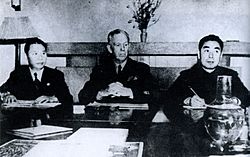
Leading the Government
In 1947, Zhang Qun became the head of the first coalition government as the president of the Executive Yuan, also known as the premier of the Republic of China. He wanted to prepare China for a constitutional government, reform land ownership, and control prices. Even though he was close to Chiang Kai-shek, he found it hard to make the political changes he wanted.
Advisor to the President
After the capital moved to Taipei, Taiwan, Zhang Qun became the chief of staff and secretary general to the president in 1954. He helped plan the government's foreign policy. He also represented the president on trips to Japan, Africa, and Europe. For example, he visited Pope Paul VI in 1965.
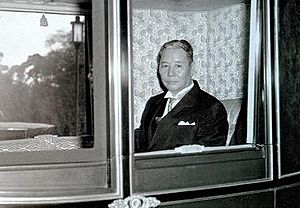
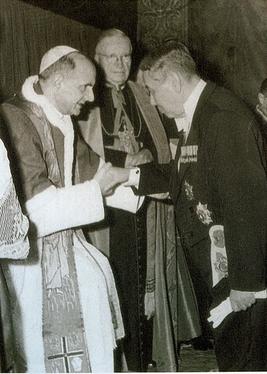
In 1972, he was very involved in talks about Japan changing its diplomatic recognition to the People's Republic of China. His last official job was chairman of a special advisory committee for the Kuomintang.
Personal Interests and Family
Zhang Qun was a talented person with many interests.
Art and Culture
He was a member of the board for the National Palace Museum. He was also known for his beautiful calligraphy, which is the art of writing. He loved collecting art and was friends with famous artists like Chang Dai-chien. He received honorary degrees from several universities around the world.
Later Years
Zhang Qun passed away on December 14, 1990, in Taipei, Taiwan, at the age of 101. He died from heart and kidney failure. For a short time before his death, he was the oldest living former head of government in the world.
His Family
Zhang Qun's wife, Ma Yu-ying, passed away in 1974. They had several children who also became successful.
- His daughter, Yalan Chang Lew, passed away in 2014 at age 97.
- His son, Dr. Philip Chi-cheng Chang, passed away in 2015 at age 96. He held important government positions, including communications minister and finance minister.
- His second son, Rev. Dr. Theodore Chi-chong Chang, passed away in 2020 at age 92. He was a religious leader and pastor.
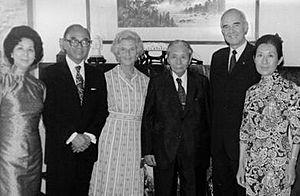
Awards and Honors
Zhang Qun received many awards for his service, including:
 Order of National Glory
Order of National Glory Order of Blue Sky and White Sun
Order of Blue Sky and White Sun Order of Chiang Chung-Cheng
Order of Chiang Chung-Cheng Order of the Brilliant Star, Special Class with Grand Cordon
Order of the Brilliant Star, Special Class with Grand Cordon Order of the Three Stars, 1st Class (January 19, 1937)
Order of the Three Stars, 1st Class (January 19, 1937)
See also
 In Spanish: Chang Ch'ün para niños
In Spanish: Chang Ch'ün para niños
 | Jackie Robinson |
 | Jack Johnson |
 | Althea Gibson |
 | Arthur Ashe |
 | Muhammad Ali |

